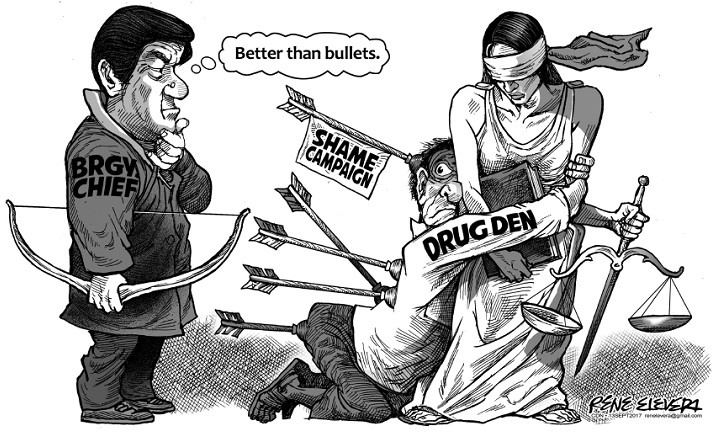
Would the threat of charges in court be enough to stop Pajo Barangay Captain Junard Chan of Lapu-Lapu City from continuing the shame campaign he launched in his area?
Chan said he would stop it, but his benefactor Lapu-Lapu City Mayor Paz Radaza wants the shame campaign replicated in other areas of the city perhaps to complement the Oplan Tokhang of the national government.
There are some supporters of the shame campaign who said this is infinitely far more preferable than the shootouts of suspected drug suspects or the summary drive-by executions of hooded vigilantes.
But be it summary killings or shaming, both pre-judge and condemn a criminal suspect by doing away with due process. Both execute the suspect’s body and soul in the eyes of society whose citizens are goaded into intolerance by its practitioners.
In trying to justify his shame campaign, Chan said he got firsthand information from residents who said their areas are occupied by drug users and peddlers. That may be the case, but verbal testimonies aren’t 100 percent sufficient to prove a person’s guilt.
Chan’s shame campaign initiative contrasts sharply with another campaign initiated by Cebu City’s barangay officials in which they declare certain areas “drug-free.”
How they come out with these assessments is something to discuss, but one cannot expect consistency in such claims unless it is backed up by actual work and independent, thorough assessments done by a multisectoral group that is comprised by both the private and public sector including the church.
If anything, Chan’s shame campaign is frankly perceived as a publicity stunt not only for him but for the Radaza administration, which wants to curry favor with the national government.
That’s to be expected since a “drug-free” declaration in barangays and local governments entitle them to additional revenue support from Manila. But being one of the Big Three in Metro Cebu with substantial investments pouring in, one would think that Lapu-Lapu City isn’t that dependent on the Internal Revenue Allotment (IRA) to shore up its earnings.
It’s more about political support then. But to revisit previous arguments, Chan’s shame campaign, while naming only places as drug dens without specifically branding its occupants as drug users, had been ruled as unconstitutional by the courts.
The Commission on Human Rights (CHR) should make good on its promise to file charges against Chan if only to drive home the message that the shame campaign isn’t only illegal but has no place in the war against illegal drugs even if the agency doesn’t enjoy the support of the President.
Even if other barangays in Lapu-Lapu City would employ Chan’s initiative, that still doesn’t make it right and legal. Yet strength in numbers and public opinion will determine if this shame campaign will continue as is.

